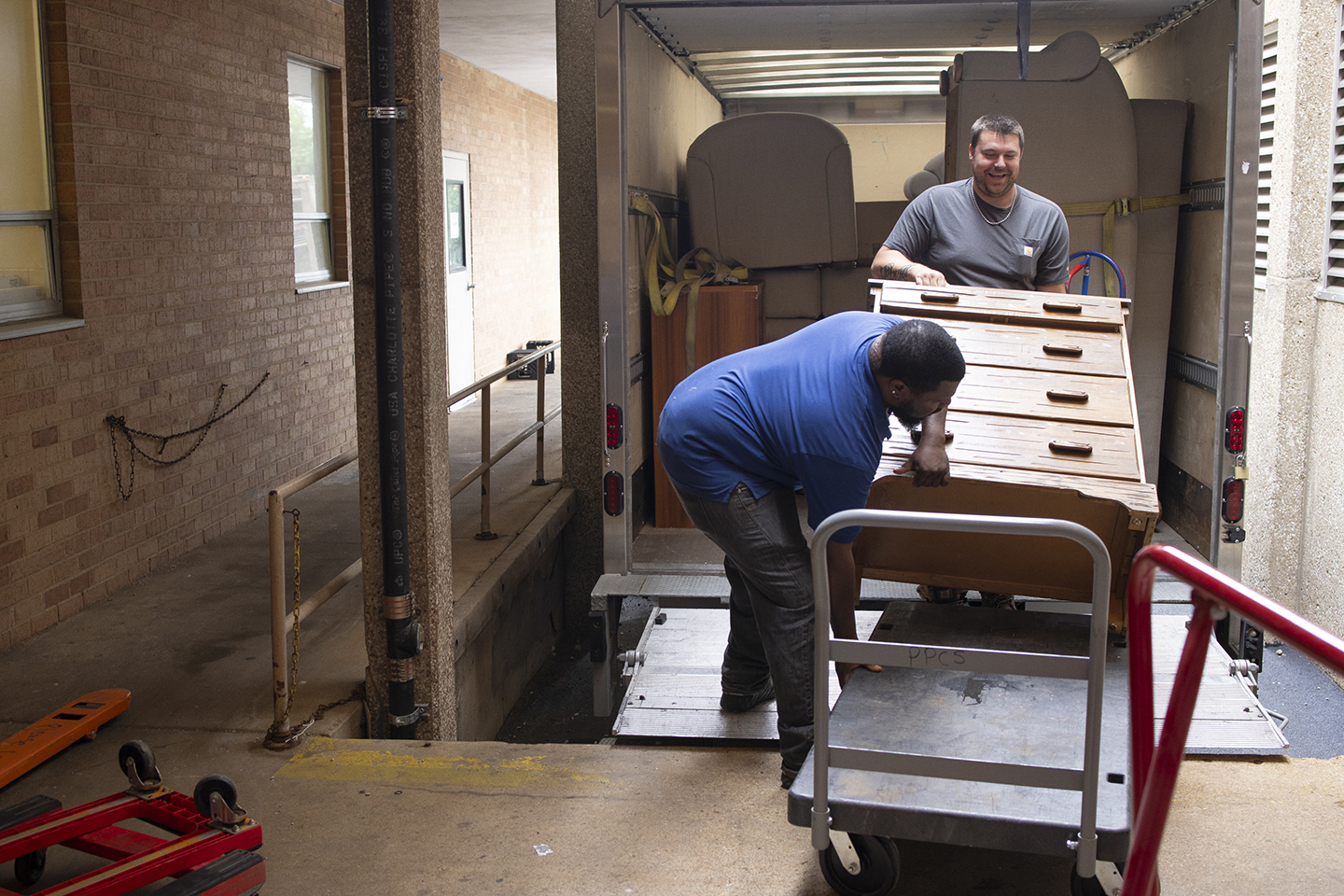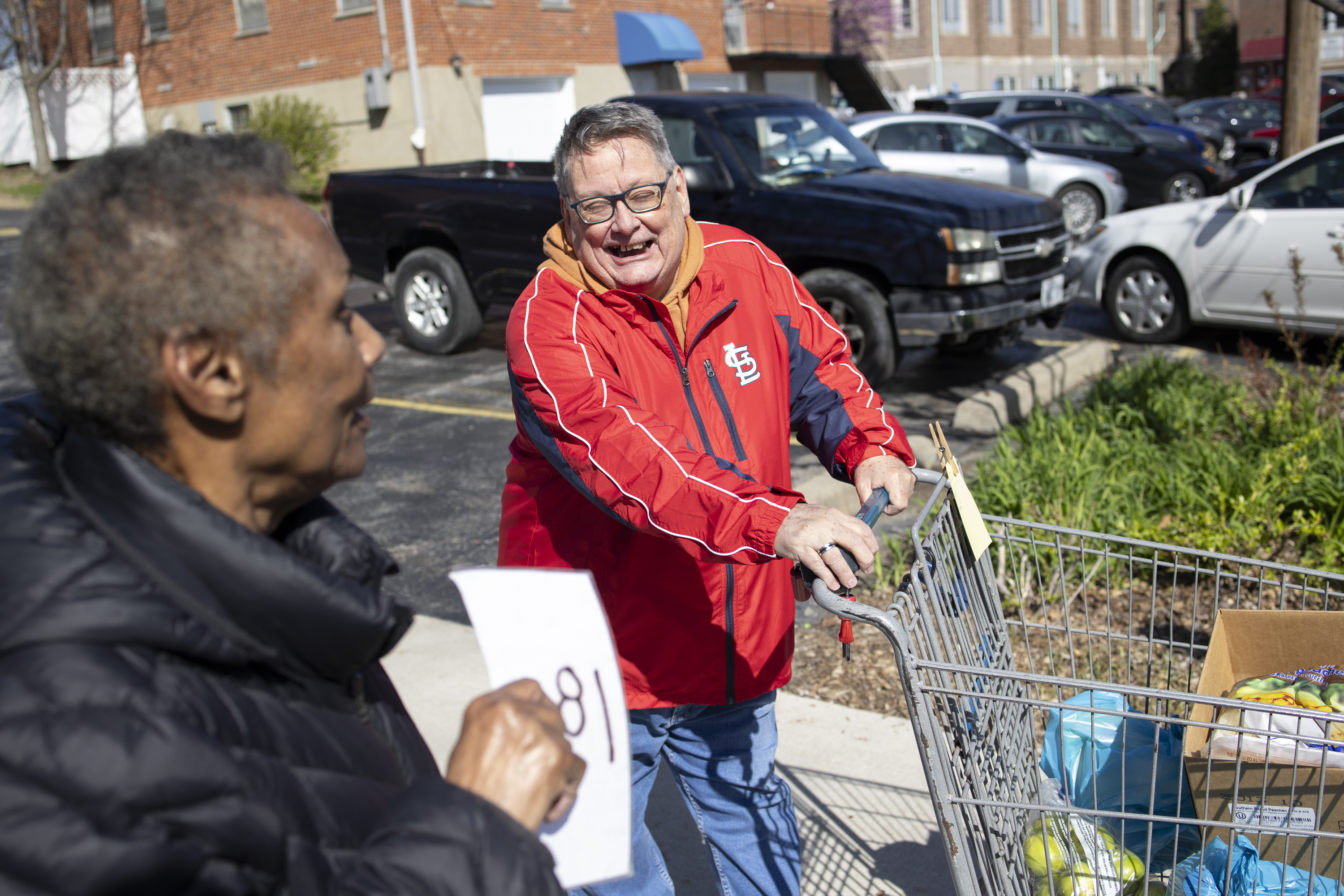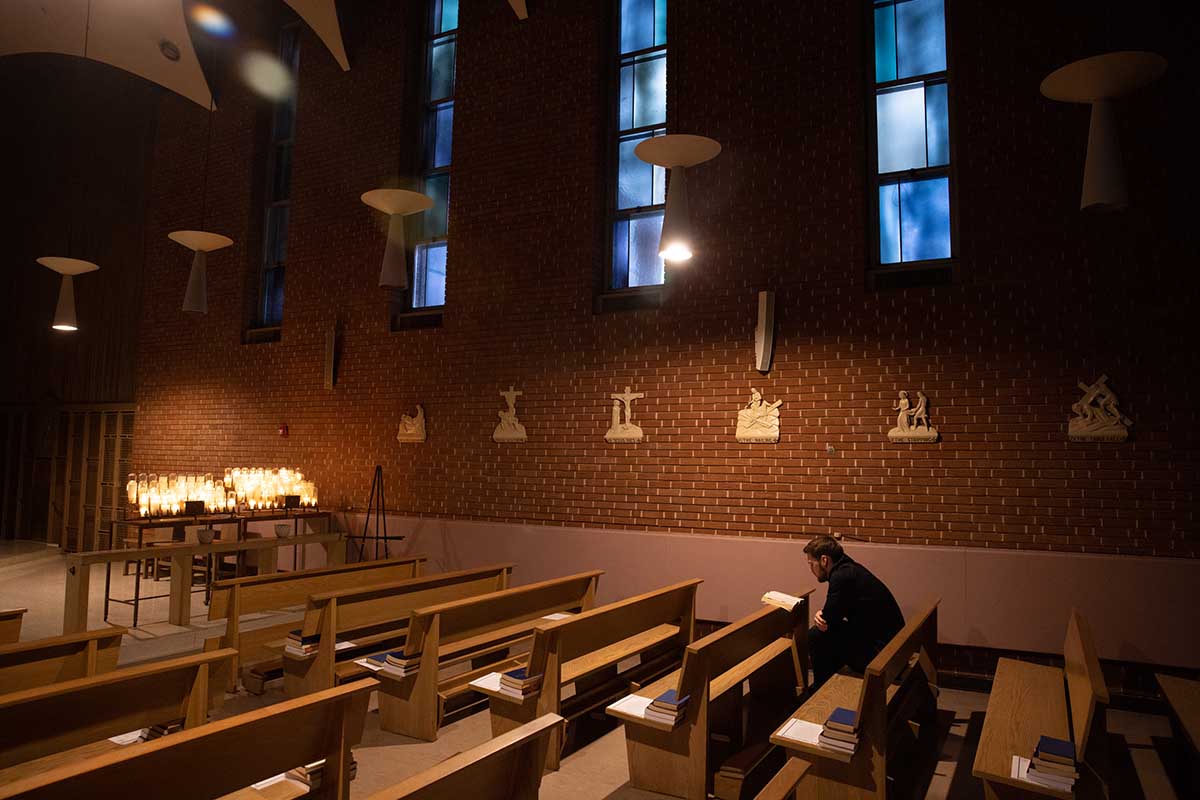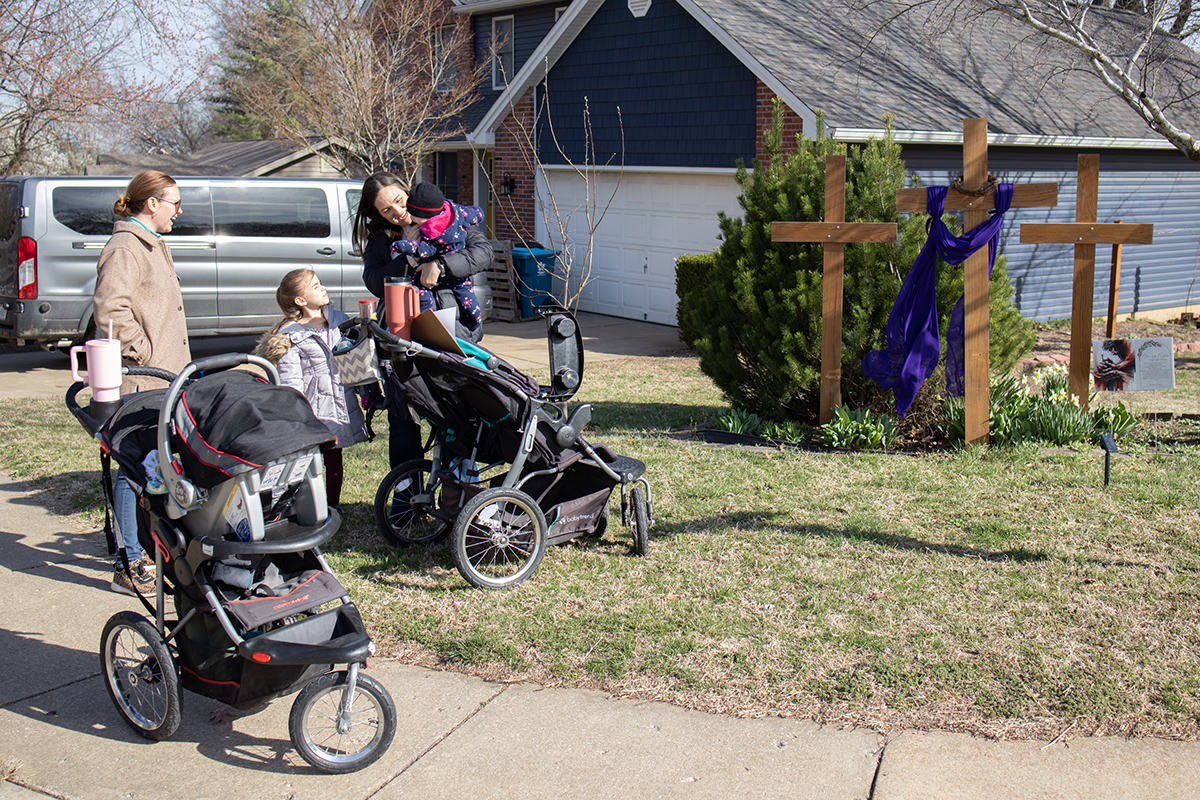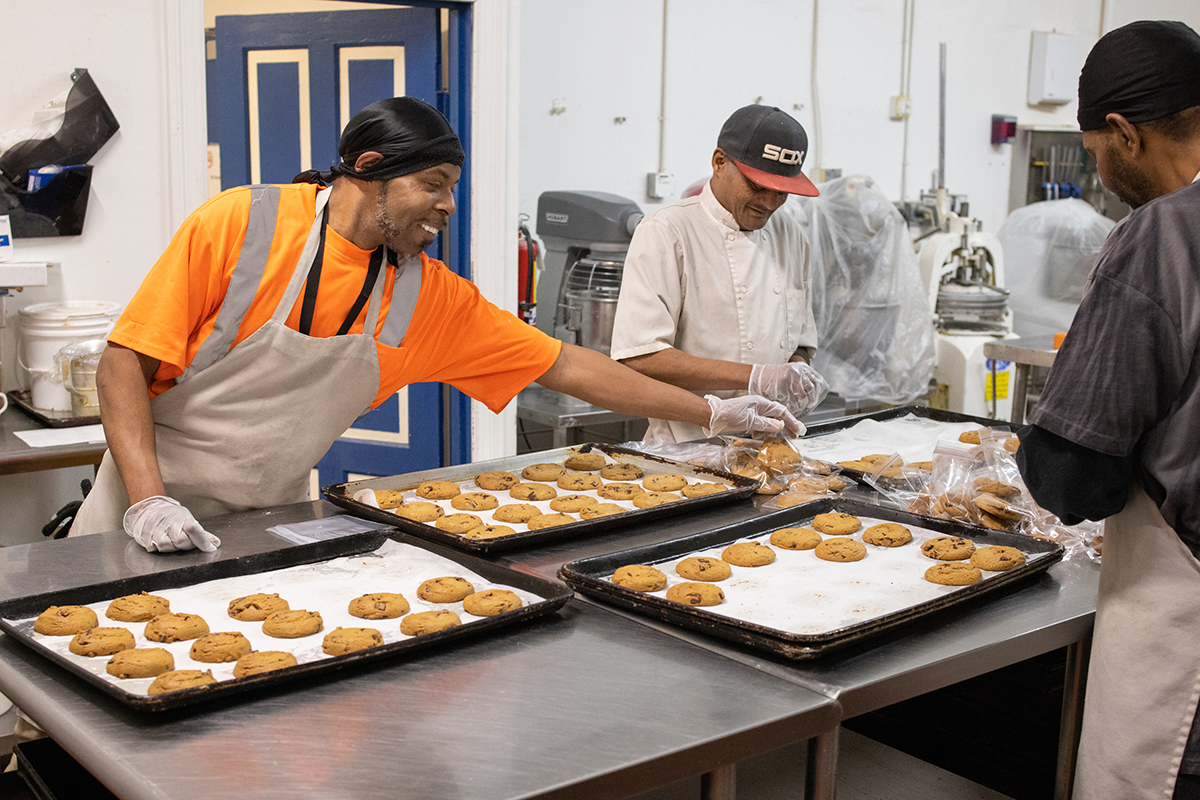Vincentian service to others in need embodies a mission to serve Christ, see His face in others
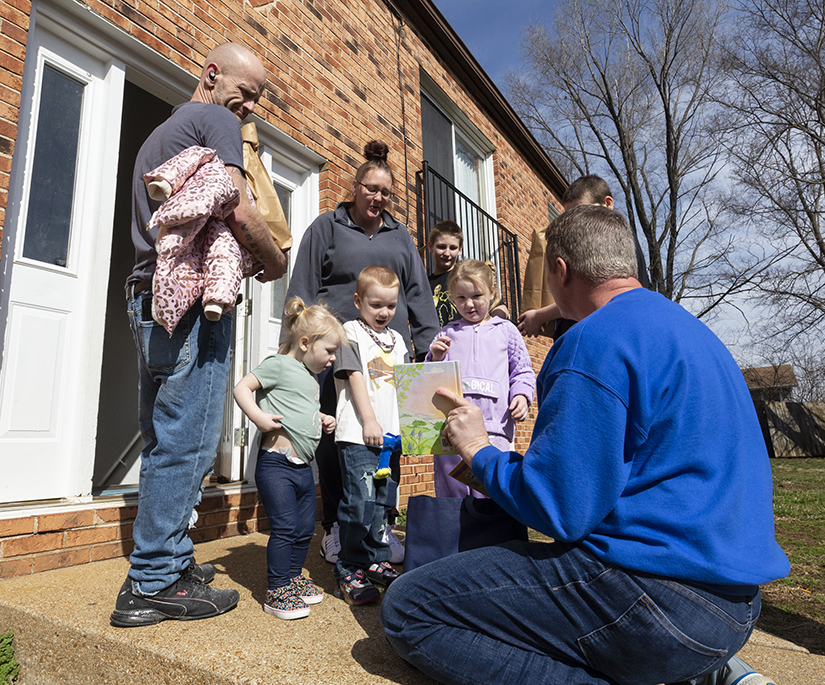
The Vincentians’ longstanding outreach to others in need includes important element of building relationships with those they serve
There’s always something happening at St. Vincent de Paul Parish. One of the oldest churches in the city of St. Louis, it has been a mainstay in the community for 180 years and long known for its outreach to the poor.
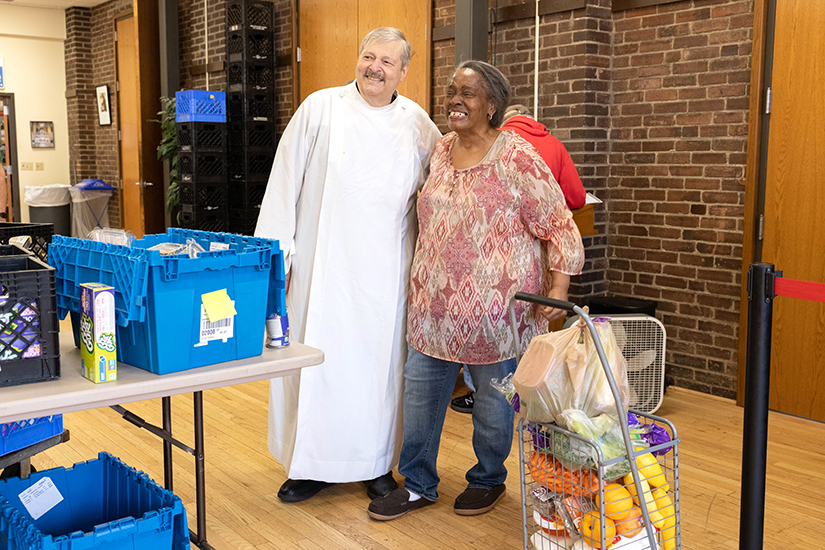
A recent rainy Friday morning was no different. A group of men unloaded a van filled with fresh foods donated from a nearby Fields Foods grocery store. Those items were placed on tables in the parish hall for anyone in the community to stop by and take what they wished. Meanwhile, two women volunteers distributed lunches to go at a window.
Vincentian Father Dan Thiess was buzzing around the parish hall, helping where he could until he had to leave to celebrate the noon Mass.
“Our mission is to follow Christ, the evangelizer of the poor,” he said. St. Vincent de Paul, the founder of the Vincentians, “didn’t say ‘come follow me,’ he said ‘follow Christ.’ And Christ set the example for us.”
St. Vincent de Paul Parish embodies the preferential option for the poor, one of the tenets of Catholic social teaching. Catholic tradition recalls the story of the Last Judgment (Matthew 25:31-46), which instructs us to put the needs of the poor and vulnerable first.
The parish collaborates with nearby Sts. Peter and Paul Parish in Soulard to offer an evening meals program. Other regular programs include a free clothing window, a food pantry and the Suds of Love program, which provides laundry soap, money for washing machines, accompaniment and snacks for people who are homeless or experience poverty. On Sundays, parishioners gather after Mass in the parish hall and invite the community for free coffee and donuts or lunch.
“All of it starts with our prayer, and it’s in our relationships,” Father Thiess said. “It’s relationships not only with each other as parishioners, but also with the people we serve, who become our friends. You get to know them, and you can say, ‘How are you doing?’ As that relationship grows, they reveal more, and we can try to meet their needs.”
Society of St. Vincent de Paul
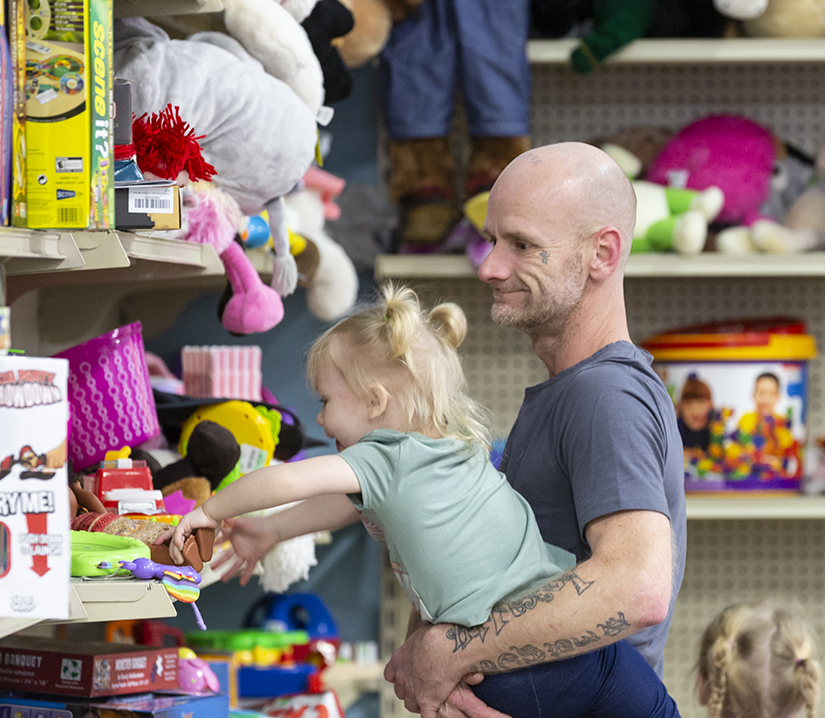
How are you doing?
That simple question meant more to Amber Collins than any of the help she’d been receiving from the Society of St. Vincent de Paul in the last few months.
Several months ago on a frigid morning, Dennis Tonkovic had stopped by Collins’ apartment to deliver food vouchers. They sat for a bit in his warm car; he asked what was going on in her life.
The mom of five let it all out. She was working, but she was having trouble keeping ahead of the bills. Tonkovic, a volunteer with the society’s conference at St. Paul Parish in Fenton, said he could help relieve some of the financial burdens — he also encouraged her to place her trust in God.
“I never had somebody just listen,” she later texted him. “Just him asking, ‘How are you,’ and having someone listen. That was the most valuable and the most precious thing to me.”
For nearly 180 years, the Society of St. Vincent de Paul has helped people to grow spiritually through person-to-person service to people in need. Volunteers make home visits to those in need to provide services, including arranging assistance with utilities, housing, prescriptions and transportation needs.
Tonkovic and fellow Vincentian volunteer Rich Aman have worked together to help the family in different ways. Aman offered rides to Collins when she was having car trouble.

“He drops what he’s doing,” Collins said. “You might have had plans, and you took it upon yourself to drop what you’re doing and do something for me and my family. Most people wouldn’t do that.”
But Tonkovic said what’s more important is how they accompany those they serve, offering opportunities to grow in a relationship with God. Sometimes that means praying together, sharing a reflection or spiritual readings, or giving religious books to the kids. Other times, it’s an invitation to church or the parish fish fry.
“We are not here merely as a purse to solve the financial needs,” Tonkovic said. “Our primary focus is to plant the seed of God. We do that as a sounding board to help them make decisions, and just being there for them.”
Julie Komanetsky, director of Vincentian Programs and Strategic Partnerships with the St. Louis Society of St. Vincent de Paul, noted that the role of the society dictates that Vincentians seek the poor, listen to them respectfully and seek the face of Christ in those they serve, while being Christ to them, too.
While helping at a MARC (Multi-Agency Resource Center) event last summer after flooding in the St. Louis area, Komanetsky recalled meeting an older woman who had experienced significant damage from the flood waters.
“I took down her information and offered her a gift card for food, which she took,” she said. “Then I asked to pray with her. She prayed for me, too. She then told me, ‘This means more to me than the gift card you gave me.’”
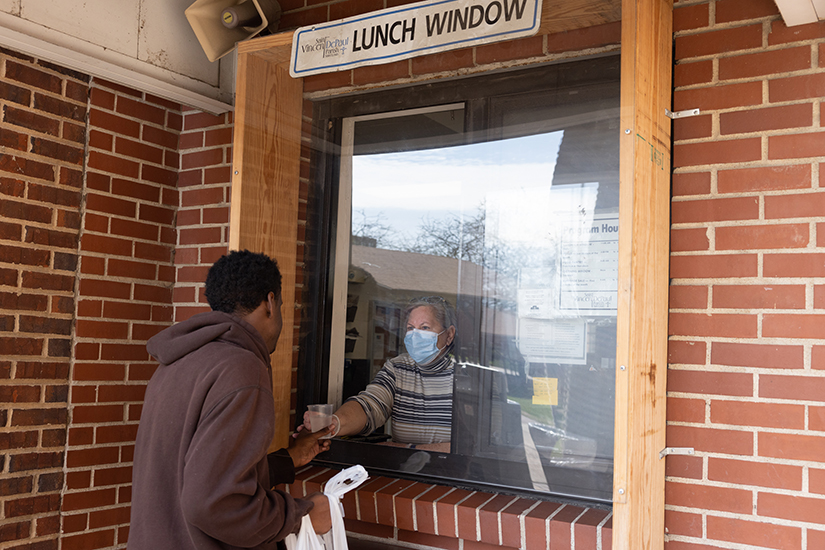
Frederic Ozanam, who started the Society of St. Vincent de Paul in Paris, France, in 1833, once said: “The question which divides men in our time is no longer a question of political systems. It is a social question: that is, of knowing which will prevail: the spirit of selfishness or the spirit of sacrifice? Whether society is to be simply a great opportunity of exploitation for the benefit of the strongest or a dedication of everyone for the benefit of all.”
Through the society, “there is that ability to ease someone’s burdens just with our presence,” Komanetsky said. “It’s knowing that people are not alone. The Vincentians remind us that God is with people and that He loves them.”
Catholic social teaching and Lent
Catholic social teaching is the collection of the Church’s wisdom on building a just society and living lives of holiness amidst the challenges of modern society. Modern Catholic social teaching has been articulated through a tradition of papal, conciliar and episcopal documents, beginning with Pope Leo XIII’s 1891 encyclical “Rerum novarum: On capital and labor.”
The Compendium of the Social Doctrine of the Church explains, “The Church exists and is at work within history. She interacts with the society and culture of her time in order to fulfill her mission of announcing the newness of the Christian message to all people, in the concrete circumstances of their difficulties, struggles and challenges. She does so in such a way that faith enlightens them so that they can understand the truth that ‘true liberation consists in opening oneself to the love of Christ.’ The Church’s social pastoral ministry is the living and concrete expression of the full awareness of her evangelizing mission in the social, economic, cultural and political realities of the world.” (Compendium of the Social Doctrine of the Church, 524)
Catholic social teaching is “an essential part of being Catholic,” said Father Don Henke, associate professor of moral theology at Kenrick-Glennon Seminary and pastor of St. Michael the Archangel Parish in Shrewsbury. But because of the wideness and depth of moral issues that make up social teaching, it can often be misunderstood. Some other aspects of moral theology are founded on “negative principles,” like “thou shalt not steal, thou shalt not kill,” Father Henke explained. “But what makes Catholic social teaching unique — and a lot more difficult — is that it focuses primarily on positive moral principles. It draws us to consider the things that we should do.”
It’s easy to tell if we’ve stolen or killed someone. But we have to wrestle with the question of whether we are truly upholding the dignity of all people, or showing preferential care for the poor, Father Henke said, and people can live out the teachings in a vast number of ways.
The important thing is that we do recognize our duty to participate in the work of Christ in the world, Father Henke said. “As St. Teresa of Avila said, we are Christ’s hands and feet, we are the way Jesus cares for people in the world,” he said.
Engaging in social efforts is a natural path for evangelization, too, when we share our “why” with others, he said.
“It would be wasting good efforts if we’re not saying that we are engaging in and doing these things because of our love for Jesus,” Father Henke said. “We’re modeling our lives after Him, and we’re meant to show our love of Him by how we love our neighbor.”
The reflection and sacrifice that we’re all called to during Lent makes the season an optimal time to consider how we are engaged in and upholding the principles of Catholic social teaching, said Father Henke.
During each week of Lent, the St. Louis Review will feature one of the seven themes of Catholic social teaching.
Feb. 20: Life and Dignity of the Human Person
Feb. 27: Call to Family, Community and Participation
March 6: The Dignity of Work and the Rights of Workers
March 13: Preferential Option for the Poor
March 20: Rights and Responsibilities
March 27: Solidarity
April 3: Care for God’s Creation
To read more about the seven themes of Catholic social teaching, visit stlreview.com/3YtSQWO.
For more resources on Catholic social teaching, visit stlreview.com/3Isancy.
Read installments of this series by visiting stlreview.com/3xnateX
Preferential Option for the Poor
A basic moral test is how our most vulnerable members are faring. In a society marred by deepening divisions between rich and poor, our tradition recalls the story of the Last Judgment (Matthew 25:31-46) and instructs us to put the needs of the poor and vulnerable first.
To learn more, see stlreview.com/3ZuqJqX
>> Do you want to serve the poor?
Germaine Price was skimming the diocesan newspaper when she came across a classified ad from the Daughters of Charity.
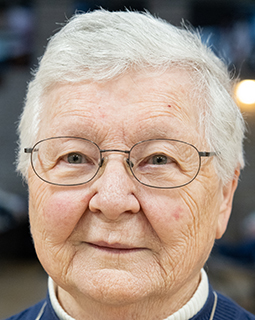
It said: Do you want to serve the poor?
“That was it,” she said. “I had never heard of the Daughters of Charity. I had never seen one.”
Germaine was a teenager who lived in a rural part of the Diocese of Green Bay, Wisconsin. She was saving up money to go to college and wanted to become a teacher. But it seems something was pulling her in a different direction — call it providence or the Holy Spirit. She wrote to the Daughters and by September of 1957, she was accepted into the postulancy in St. Louis.
“I think it was God’s idea, because I was planning to do a lot of other things,” she said. “I don’t know how else to explain it.”
Over six decades, Sister Germaine has accumulated a variety of life experiences, including teaching and parish work in the United States and among the poor in missions abroad, including in Puerto Rico, Turkey, Burundi, Romania and Haiti. She also went to the United Nations to help secure a non-governmental agency (NGO) status for the Daughters of Charity.
In Africa, she led formation with the first women from Burundi and Rwanda who asked to be members of the Daughters of Charity. They were attracted to the community, because they saw the work of our sisters there in their countries.
Sister Germaine now serves as a senior sister in residence at St. Vincent de Paul Parish in St. Louis. Among her involvement with other ministries at the parish, she helps coordinate the Suds of Love program, which provides laundry soap, money for washing machines, accompaniment and snacks twice a month for people who are homeless or experience poverty.
Service to the poor means to “recognize the dignity of every human person and to recognize that God dwells in them, just as He dwells in every other person,” Sister Germaine said. “Once we know them, we look at what are their needs and how can we respond to them?”
“We are companions with them on the journey,” she said. “Their needs vary and so to the works of the sisters. The poor bless my life every day.”
The Vincentian Family
The Vincentian Family includes numerous organizations and religious communities with connections to St. Vincent de Paul, a 17th-century French priest, who was known for his work with the poor.
He founded the Ladies of Charity, an organization of lay women dedicated to serving the poor; the Congregation of the Mission (Vincentian priests and brothers); and the Daughters of Charity (community of women religious co-founded with St. Louise de Marillac).
Blessed Frederic Ozanam, inspired by a Daughter of Charity, Sister Rosalie Rendu, founded the Society of St. Vincent de Paul in Paris, France, in 1833. The society is present in more than 150 countries, with 800,000 members and 1,500,000 volunteers. Every day, it helps more than 30 million people, according to the International Confederation of St. Vincent de Paul.
Society of St. Vincent de Paul
The Society of St. Vincent de Paul is an international Catholic lay organization dedicated to helping women and men grow spiritually by offering person-to-person service to people in need. Volunteers make home visits to those in need to provide services, including arranging utility, housing, prescription assistance and transportation needs.
More than 3,400 trained volunteers assist over 225,000 people and provide more than $14 million in direct aid to those in need in the St. Louis metropolitan area. The Society of St. Vincent de Paul in St. Louis is a nonprofit organization.
Learn more and volunteer: svdpstlouis.org
St. Vincent de Paul Parish
Founded in 1843, it is one of the oldest parishes in the city of St. Louis. The parish has a variety of outreach ministries to the neighborhood. Volunteer opportunities include the lunch window and clothing window, food pantry, evening meals (partnering with Sts. Peter and Paul Church), Suds of Love laundry program and after school tutoring.
Get involved: Contact Pat Poehling, volunteer coordinator, at mspat@stvstl.org or (314) 231-9328.
Daughters of Charity
The Daughters of Charity are a community of consecrated women devoting their lives to serving the poorest and most abandoned individuals in today’s society. The Daughters make a special vow of service of the poor, along with vows of poverty, chastity and obedience, as a continual affirmation of devotion to God and passion to live a humble life helping the poor.
Do you want to serve the poor? Contact the St. Louis-based Province of St. Louise: daughtersofcharity.org.
Congregation of the Mission (Vincentian priests and brothers)
St. Vincent de Paul founded the Congregation of the Mission in 1625 in Paris, France, bringing to the mission a passion for serving the poor. They lead parish missions, operate a range of assistance programs for the materially poor, console patients and their families as hospital chaplains and assist with the formation of future priests in seminaries across the country.
Learn more: Visit the Vincentians’ Western Province at www.vincentian.org
Ladies of Charity
Founded by St. Vincent de Paul and St. Louise de Marillac in Paris, the Ladies of Charity originally were founded to respond to the needs of the poor in 17th century France. Today, the Ladies of Charity are associations of women across the world who participate in the Vincentian mission of prayer and service.
Learn more about the Ladies of Charity at St. Vincent de Paul Parish in St. Louis: www.ladiesofcharitystlstv.org
>> Whatever you did for the least, you did for me
“When the Son of Man comes in his glory, and all the angels with him, he will sit upon his glorious throne,
and all the nations will be assembled before him. And he will separate them one from another, as a shepherd separates the sheep from the goats.
He will place the sheep on his right and the goats on his left. Then the king will say to those on his right, ‘Come, you who are blessed by my Father. Inherit the kingdom prepared for you from the foundation of the world.
‘For I was hungry and you gave me food, I was thirsty and you gave me drink, a stranger and you welcomed me, naked and you clothed me, ill and you cared for me, in prison and you visited me.’
Then the righteous will answer him and say, ‘Lord, when did we see you hungry and feed you, or thirsty and give you drink? When did we see you a stranger and welcome you, or naked and clothe you? When did we see you ill or in prison, and visit you?’
And the king will say to them in reply, ‘Amen, I say to you, whatever you did for one of these least brothers of mine, you did for me.’
Then he will say to those on his left, ‘Depart from me, you accursed, into the eternal fire prepared for the devil and his angels. For I was hungry and you gave me no food, I was thirsty and you gave me no drink, a stranger and you gave me no welcome, naked and you gave me no clothing, ill and in prison, and you did not care for me.’
Then they will answer and say, ‘Lord, when did we see you hungry or thirsty or a stranger or naked or ill or in prison, and not minister to your needs?’
He will answer them, ‘Amen, I say to you, what you did not do for one of these least ones, you did not do for me.’ And these will go off to eternal punishment, but the righteous to eternal life.”
Matthew 25:31-46
There’s always something happening at St. Vincent de Paul Parish. One of the oldest churches in the city of St. Louis, it has been a mainstay in the community for … Vincentian service to others in need embodies a mission to serve Christ, see His face in others
Subscribe to Read All St. Louis Review Stories
All readers receive 5 stories to read free per month. After that, readers will need to be logged in.
If you are currently receive the St. Louis Review at your home or office, please send your name and address (and subscriber id if you know it) to subscriptions@stlouisreview.com to get your login information.
If you are not currently a subscriber to the St. Louis Review, please contact subscriptions@stlouisreview.com for information on how to subscribe.

